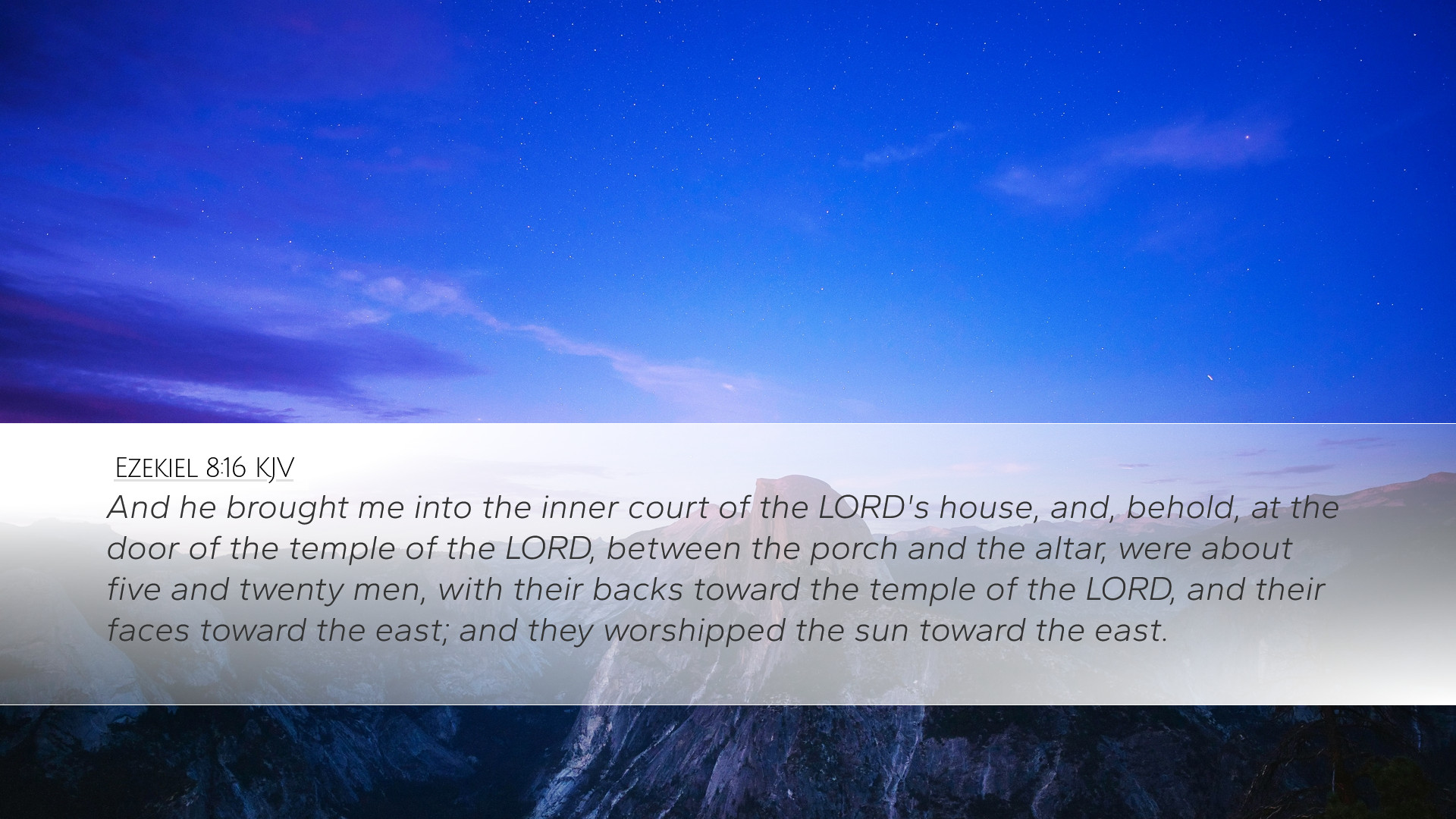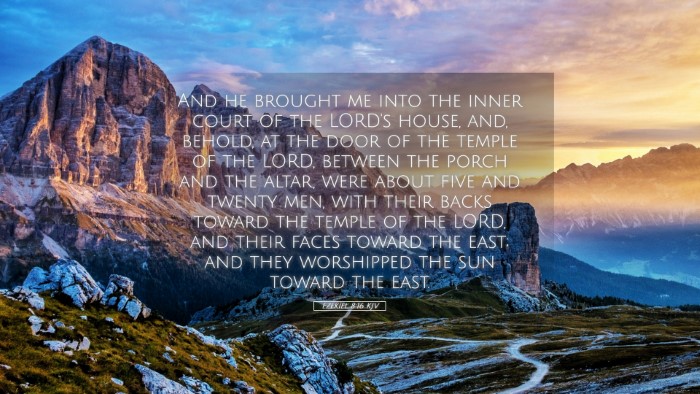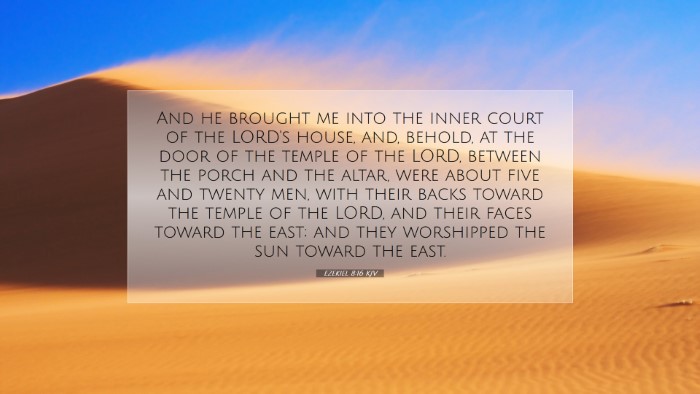Bible Commentary on Ezekiel 8:16
Ezekiel 8:16 (KJV): "And he brought me into the inner court of the Lord's house, and behold, at the door of the temple of the Lord, between the porch and the altar, were about five and twenty men, with their backs toward the temple of the Lord, and their faces toward the east; and they worshipped the sun toward the east."
Introduction
This passage from the Book of Ezekiel is part of a larger vision where the prophet is shown various abominations occurring within the temple of God during a time of deep spiritual corruption in Israel. Ezekiel's vivid descriptions of the idolatrous practices highlight the severity of the people's turning away from Yahweh. Understanding this verse requires exploring the symbolic and literal implications of worship practices, along with the historical context surrounding them.
Contextual Background
Ezekiel prophesied during the Babylonian exile, a period marked by significant turmoil for the Israelites. The temple in Jerusalem was not only the center of worship but also served as a representation of God's presence among His people. This chapter reveals the shocking reality of how the temple was misused and how the people had turned to idolatry in violation of their covenant with God.
Commentary Insights
Matthew Henry's Commentary
Matthew Henry draws attention to the shocking nature of the abominations described. He notes that the symbolism of the temple is foundational, as it represents God's holiness and presence. The worship of the sun, he argues, signifies a complete departure from true worship. The idolatrous practice of the priests and people indicate their disinterest in God's commandments and their embrace of pagan practices.
- Inner Court Significance: Henry emphasizes the importance of the inner court as a place designated for sacred worship. The proximity to the temple underscores the gravity of the offense being committed there.
- Turning Their Backs: The act of turning their backs to the temple while facing east to worship the sun symbolizes a rejection of God. It illustrates both physical and spiritual apostasy, showcasing their hearts had strayed far from God.
- Warning to Current Believers: Henry warns modern believers of the dangers of allowing secular influences to erode their devotion, emphasizing that God desires undivided worship.
Albert Barnes' Notes
Albert Barnes provides detailed analysis of the physical layout and ritual practices of the temple. He discusses the significance of the altar and the porch as sacred spaces that should have been reserved for honoring God. Barnes comments on the 'twenty-five men' who participated in this idolatry—indicating that they were likely priests.
- Idolatry's Roots: Barnes identifies the historical context of sun worship in Israel, tracing its origins to remnants of Canaanite religions that had infiltrated Israelite practices.
- Symbolism of Worship: He stresses that worship directed towards the sun signifies not merely an error in practice but represents a rejection of the sovereignty of the Creator, highlighting that the sun had become a false deity in their worship.
- Judgment Coming: Barnes concludes that such blatant idolatry provokes divine wrath, and Ezekiel’s vision serves as a warning that judgment will follow such disobedience.
Adam Clarke's Commentary
Adam Clarke provides an in-depth exploration of the theological implications of this passage, linking it to covenantal fidelity. Clarke discusses the gravity of the spiritual state of the people, reflecting on how their actions represent not only personal failures but corporate ones as well.
- Corporate Responsibility: Clarke highlights that the involvement of the priests in this idolatrous worship escalates the seriousness of the breaches within the covenant community.
- Theological Implications: He posits that this passage serves as a stark reminder of what happens when a community neglects its duty to uphold God's holiness and instead embraces cultural idols.
- Call for Repentance: Clarke urges the necessity of repentance and restoration, emphasizing that God's grace is available, but must be received through sincere contrition.
Theological Reflections
The profound implications of Ezekiel 8:16 extend beyond its immediate historical context. For pastors, theologians, and scholars, this passage serves as a cautionary tale regarding the integrity of worship and the dangers of cultural assimilation. The text invites reflection on the nature of true worship and the conditions under which God’s presence can remain among His people.
Worship and Idolatry
The actions of the priests illustrate a stark dichotomy between true worship and idolatry. In contemporary settings, the challenge remains relevant: individuals and communities are consistently faced with the temptation to substitute genuine devotion with alternative practices that do not honor God.
Divine Presence and Holiness
Understanding the significance of God's presence in the temple underscores the importance of holiness. The blatant turning away from the temple's sanctity suggests a breaking of the covenant—reminding us that believers today are called to uphold God's holiness in all aspects of their lives.
Implications for Worship Today
In light of this passage, modern worship should reflect sincerity, integrity, and adherence to biblical principles. The danger of syncretism—blending pagan practices with biblical faith—must be transparently acknowledged and addressed within church communities.
Conclusion
Ezekiel 8:16 serves as a vivid reminder of the reality of idolatry and the dire consequences that follow when a community forsakes their God. The insights from Matthew Henry, Albert Barnes, and Adam Clarke emphasize that worship must be centered around God's sovereignty and holiness. As spiritual leaders and scholars ponder these truths, they are called to foster environments that are conducive to true worship and to guard against the encroachments of secularism in their hearts and communities.


